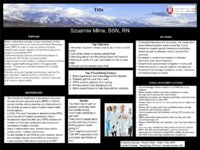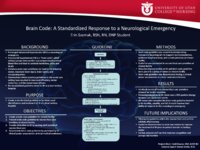The Graduate Nursing Project collection includes Doctor of Nursing Practice (DNP) Scholarly Projects and Master's students' non-thesis projects submitted as part of program requirements.
TO
1 - 25 of 6
| Title | Creator | Date | Description | Relation Is Part Of | ||
|---|---|---|---|---|---|---|
| 1 |
 |
Activating the Rapid Response Team: Barriers and Facilitating Factors for Oncology Nurses | Milne, Suzanne | 2017 | POSTER | Graduate Nursing Project, Doctor of Nursing Practice, DNP, Poster |
| 2 |
 |
Prediabetes Screening in the Emergency Room | Aloia, Andrew | 2017 | POSTER | Graduate Nursing Project, Doctor of Nursing Practice, DNP |
| 3 |
 |
Brain Code: A Standardized Response to a Neurological Emergency | Szemak, Erin | 2017 | POSTER | Graduate Nursing Project, Doctor of Nursing Practice, DNP |
| 4 |
 |
Prediabetes Screening in the Emergency Room | Aloia, Andrew | 2017 | Diabetes continues to be a leading cause of morbidity and mortality and contributes substantially to healthcare costs. Prediabetes indicates a future risk for diabetes. Consequently prediabetes screening is paramount in combating our country's diabetes problem. The Centers for Disease Control and Pr... | Graduate Nursing Project, Doctor of Nursing Practice, DNP |
| 5 |
 |
Activating the Rapid Response Team: Barriers and Facilitating Factors for Oncology Nurses | Milne, Suzanne | 2017 | The Institute for Healthcare Improvement introduced the idea of a rapid response team (RRT) in 2004. The goal was to quickly mobilize critical expertise and intervention to the bedside as soon as signs of patient deterioration are noted. If the RRT is called, patients can receive appropriate interve... | Graduate Nursing Project, Doctor of Nursing Practice, DNP |
| 6 |
 |
Brain Code: A Standardized Response to a Neurological Emergency | Szemak, Erin | 2017 | Intracranial hypertension (IH) is a neurological emergency that can lead to profound disability and death and is consequently referred to as a brain code. Intracranial hypertension is the sequelae of typical acute care diseases or injuries such as stroke, traumatic brain injuries (TBIs), and hepatic... | Graduate Nursing Project, Doctor of Nursing Practice, DNP |
1 - 25 of 6
